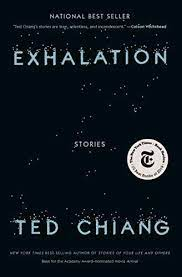Provenance: Elliot Bay Bookstore, which was originally down in Pioneer Square but has moved up to Capitol Hill to occupy part of the old Oddfellows Hall. I was up there to meet a former colleague for dinner, and wanted to stop in and get a different book (which is a different story).
Review: I was (very briefly) in a writer's group with Ted Chiang. Ted is one of those writers who publishes maybe one story a year, and that story in then nominated or wins various Hugos, Nebulas, and Locus awards. He's really that good. A short story from his previous collection, Stories of Your Life and Others was made into the movie Awakening.
This volume is a collection of tales from since that earlier volume, and is just as fantastic. He creates realistic alien worlds, and then plays within them - The title story involves a robotic race, where the narrator literally trepans himself in order to understand memory. In "Omphalos", he posits a universe where Young Earth Theory is backed up by the facts and evidence."The Truth of Fact, the Truth of Feeling" extends the always-recording lifestyles into creating a perfect history of what really happened. Each is a self-contained world that feels totally reasonable.
Chiang's stories also talk about free will, and the absence of it in a deterministic universe, a lot. in "The Merchant and the Alchemist's Gate" we deal with time travel in a deterministic universe, where the past cannot change because of what has happened, but those that travel into the past have their own reasons for not changing it. In "What's Expected of Us" he introduces a simple device that proves the future is deterministic and unchangeable, that Free Will is an illusion, and what happens to society when that is proved. And in "Anxiety is the Dizziness of Freedom" he posits the idea of a branching multiverse that still puts the question of free will to the test by allowing access between the various branches (quick answer - capitalism and a lot of therapy).
The most frightening story does not involve a robot operating on his own brain in realtime, but "The Lifecycle of Software Objects" that deals with living and thinking digital intelligence and corporate thinking. The meeting of those two I found chilling when I first read it years ago, and it still frightens me to some degree.
Chiang's worlds are deterministic, and he will not bend the rules for the sake of character and story. There are few full happy endings, because the universe doesn't play that way. At best, there is understanding and acceptance for what is to come.
It's a great collection, and if you haven't discovered Ted Chiang, here's your chance.
More later,
